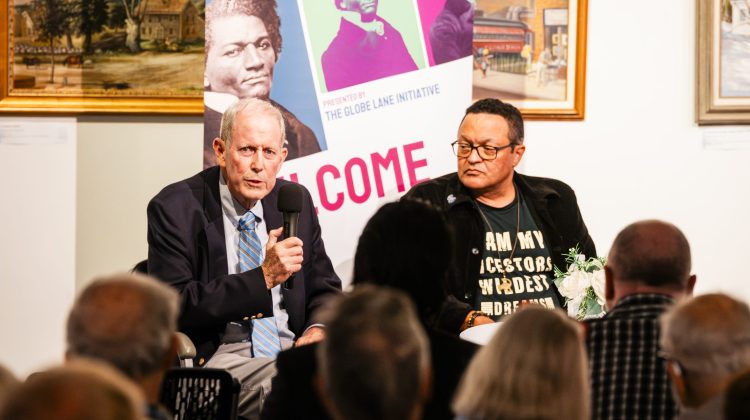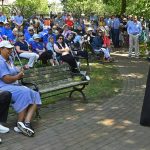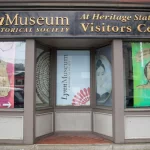LYNN — Frederick Douglass’ great-great-great grandson Kenneth B. Morris Jr. held discussions at the Frederick Douglass Collegiate Academy and the Lynn Museum and Arts Center on Tuesday in Lynn for day three of Douglass Week.
Morris Jr. launched the dialogue by speaking to the high school students about Douglass’ dedication to learning at a time where it was illegal to teach an enslaved person. He emphasized how getting an education is necessary when it comes to changing the course of history.
“My ancestors understood from a very young age that education is a path to freedom. Knowledge is power, and people who were pro-slavery didn’t want people who were enslaved to have an opportunity to read and write because that way they wouldn’t question their oppression,” Morris Jr. said.
At a time where the U.S. government downplayed the horrors of slavery, Douglass challenged this by looking directly into the camera in his photographs. Morris Jr. described this intense stare as a “strategic choice when it came to how he presented himself to the public so he could control his narrative.”
“A group of people were being ‘other-ized’ so we wouldn’t think of them as human beings. But (Douglass) vowed to not have people see him as a happy, amiable former enslaved person. He wanted people to look into his eyes and see his humanity, to see someone worthy of freedom,” Morris Jr. said.
The term “enslaved person” is preferable over the word “slave” to Morris Jr., as the latter does not recognize the individuality of people forced into slavery.
“Nobody was meant to be a slave. When you place the name ‘slave’ on them, you’re talking about their personhood. ‘Enslaved’ is a condition that has been placed upon somebody by an outside system,” Morris Jr. said.
Morris Jr. concluded the dialogue at Frederick Douglass Collegiate Academy by reminding the students that the U.S. is not far removed from its roots in slavery, even in 2025. He inspired them to ask questions about their own ancestors in order to make a difference.
“I stand one hand away from slavery. History lives in each of us. This country is the product of slavery, but it is also the product of the abolition of slavery. And through Frederick Douglass, we learned we have a right to be free. We lived in modern times in the echoes of slavery. When we listen close enough to the echoes, that is when change will happen,” he said.
Morris Jr. continued the discussion at the Lynn Museum & Arts Center and was joined by retired Item reporter Tom Dalton, who wrote the book “Frederick Douglass: The Lynn Years 1841-1848.”
During the panel, Dalton explained what drew him to research and write detailed accounts about Douglass specifically.
“To believe in something so strongly that you stand up for it and put it above your own safety, that’s a tremendous act of courage,” Dalton said.
Lynn played a pivotal role in Douglass’ activism. Living on Harrison Court, Baldwin Street, and Newhall street with his family for a total of seven years, he wrote his powerful autobiography “The Narrative of the Life of Frederick Douglass” in the city.
Morris Jr. explained why Lynn naming the Collegiate Academy, the Memorial Park, and most recently an MBTA ferry after Frederick Douglass are impactful demonstrations of dedication.
“Recognition is important because it keeps the names and the stories out there so people can learn about them. It raises questions that lead to conversations,” Morris Jr. said.
Douglass Week is organized by nonprofit The Globe Lane Initiative, which partners with Frederick Douglass historians, artists, and community groups to describe the influence of history on contemporary topics by creating thought-provoking events.
One of Douglass Week’s partners, Frederick Douglass Family Initiatives, is a human trafficking prevention and education organization that was founded by Morris Jr.
Describing human trafficking as a “form of modern day slavery,” Morris Jr. explained why he was inspired to continue to fight for his ancestors’ cause.
“I had thought slavery ended with the work my ancestors had done, but human trafficking still exists all across the world, the United States, and even in Lynn today. I have this platform with my ancestors who have sacrificed. So I thought we could perhaps leverage the historical significance of my ancestry to do something about this,” Morris Jr. said.
While Morris Jr. cannot speak on behalf of what Frederick Douglass would think of the condition of modern day times, he made an educated guess as his direct descendant.
“I think he would be somewhat pleased to see there’s been progress. But I also think he would be outraged that there’s still so much work to be done. We all have an obligation to carry our history forward,” Morris Jr. said.
He added, “There has been an inserted effort not only now, but in the history of this country to whitewash and sanitize certain history and put people of African and Native American descent into an inferior position by design by not showing us our heroes and giving us a watered-down record. We have to make sure we go back and pull on that history, and take inspiration from it — because the work is hard.”
He concluded, “Douglass Week is an important opportunity to teach and talk about him because his spirit is still alive. In the great conflict of the Civil War, he was able to rise above that and speak with moral clarity to a nation that needed to hear it. And this time, in our nation, we need a voice of moral clarity, and we can call on Frederick Douglass.”



